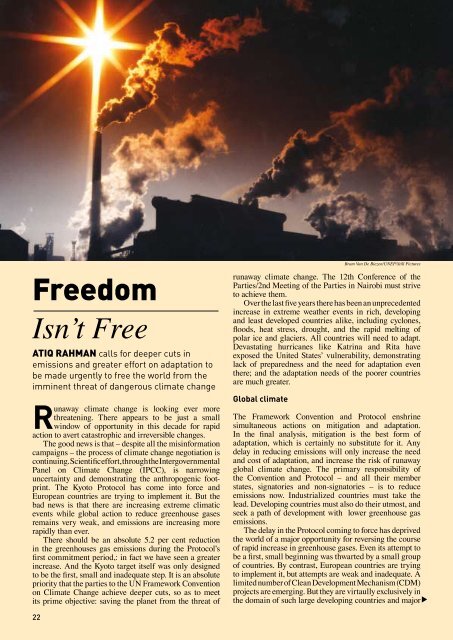UNEP Magazine "Climate change and economic development"
UNEP Magazine "Climate change and economic development"
UNEP Magazine "Climate change and economic development"
Create successful ePaper yourself
Turn your PDF publications into a flip-book with our unique Google optimized e-Paper software.
Bram Van De Biezen/<strong>UNEP</strong>/Still Pictures<br />
Freedom<br />
Isn’t Free<br />
Atiq Rahman calls for deeper cuts in<br />
emissions <strong>and</strong> greater effort on adaptation to<br />
be made urgently to free the world from the<br />
imminent threat of dangerous climate <strong>change</strong><br />
Runaway climate <strong>change</strong> is looking ever more<br />
threatening. There appears to be just a small<br />
window of opportunity in this decade for rapid<br />
action to avert catastrophic <strong>and</strong> irreversible <strong>change</strong>s.<br />
The good news is that – despite all the misinformation<br />
campaigns – the process of climate <strong>change</strong> negotiation is<br />
continuing. Scientific effort, through the Intergovernmental<br />
Panel on <strong>Climate</strong> Change (IPCC), is narrowing<br />
uncertainty <strong>and</strong> demonstrating the anthropogenic footprint.<br />
The Kyoto Protocol has come into force <strong>and</strong><br />
European countries are trying to implement it. But the<br />
bad news is that there are increasing extreme climatic<br />
events while global action to reduce greenhouse gases<br />
remains very weak, <strong>and</strong> emissions are increasing more<br />
rapidly than ever.<br />
There should be an absolute 5.2 per cent reduction<br />
in the greenhouses gas emissions during the Protocol’s<br />
first commitment period,: in fact we have seen a greater<br />
increase. And the Kyoto target itself was only designed<br />
to be the first, small <strong>and</strong> inadequate step. It is an absolute<br />
priority that the parties to the UN Framework Convention<br />
on <strong>Climate</strong> Change achieve deeper cuts, so as to meet<br />
its prime objective: saving the planet from the threat of<br />
runaway climate <strong>change</strong>. The 12th Conference of the<br />
Parties/2nd Meeting of the Parties in Nairobi must strive<br />
to achieve them.<br />
Over the last five years there has been an unprecedented<br />
increase in extreme weather events in rich, developing<br />
<strong>and</strong> least developed countries alike, including cyclones,<br />
floods, heat stress, drought, <strong>and</strong> the rapid melting of<br />
polar ice <strong>and</strong> glaciers. All countries will need to adapt.<br />
Devastating hurricanes like Katrina <strong>and</strong> Rita have<br />
exposed the United States’ vulnerability, demonstrating<br />
lack of preparedness <strong>and</strong> the need for adaptation even<br />
there; <strong>and</strong> the adaptation needs of the poorer countries<br />
are much greater.<br />
Global climate<br />
The Framework Convention <strong>and</strong> Protocol enshrine<br />
simultaneous actions on mitigation <strong>and</strong> adaptation.<br />
In the final analysis, mitigation is the best form of<br />
adaptation, which is certainly no substitute for it. Any<br />
delay in reducing emissions will only increase the need<br />
<strong>and</strong> cost of adaptation, <strong>and</strong> increase the risk of runaway<br />
global climate <strong>change</strong>. The primary responsibility of<br />
the Convention <strong>and</strong> Protocol – <strong>and</strong> all their member<br />
states, signatories <strong>and</strong> non-signatories – is to reduce<br />
emissions now. Industrialized countries must take the<br />
lead. Developing countries must also do their utmost, <strong>and</strong><br />
seek a path of development with lower greenhouse gas<br />
emissions.<br />
The delay in the Protocol coming to force has deprived<br />
the world of a major opportunity for reversing the course<br />
of rapid increase in greenhouse gases. Even its attempt to<br />
be a first, small beginning was thwarted by a small group<br />
of countries. By contrast, European countries are trying<br />
to implement it, but attempts are weak <strong>and</strong> inadequate. A<br />
limited number of Clean Development Mechanism (CDM)<br />
projects are emerging. But they are virtaully exclusively in<br />
the domain of such large developing countries <strong>and</strong> major<br />
▲<br />
22

















